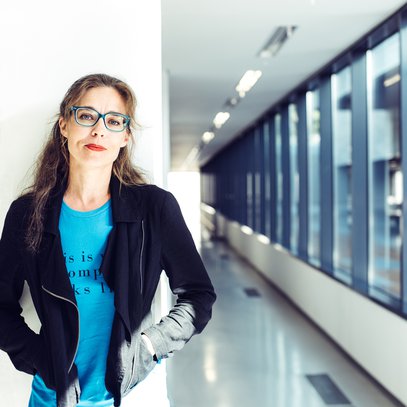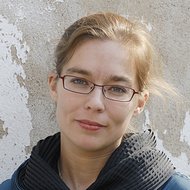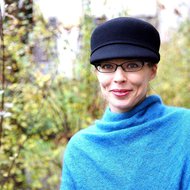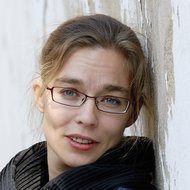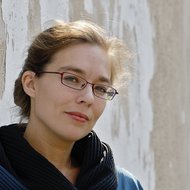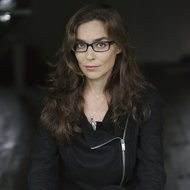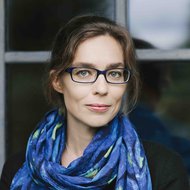Žibuoklė Martinaitytė
"It is difficult to speak about sounds, instead of just listening to them or playing with them in the composition process. Though I never considered music merely as a game - I was always looking for the hidden meaning in sounds. I want to ask an existential question and to find the answer to it with every new composition. A composition is a very particular state of mind, which transforms the composer as well as the listeners", says Žibuoklė Martinaitytė. Her music is distinguished by theatrical character, concerto-type quality, evocatively spacious atmosphere. The composer often challenges technical limitations of the instruments, sprinkling her scores with virtuoso solo passages and achieving highly expressive, sometimes even aggressive sound.
American Hodgepodge
A Thousand Doors to the World
Driving Force
zoom in 6: new music from Lithuania - Completely Embraced by the Beauty of Emptiness
The Blue of Distance
Biography
Žibuoklė Martinaitytė-Rosaschi (b.1973 in Saint Petersburg, Russia) studied at the J. Naujalis Gymnasium of Music in Kaunas in 1979-1991. She continued her composition studies at the Lithuanian Academy of Music (1991-1993 under Prof. Bronius Kutavičius, 1993-1997 under Prof. Julius Juzeliūnas). In 1998 she attended the New Music Summer Courses in Darmstadt (Germany). The same year she received "Kulturkontakt Austria" sholarship for the participation in the 6th International Academy for New Composition and Audio Art in Schwaz/Tirol (Austria), where she studied composition with Boguslaw Schaffer (Austria), computer composition with Marek Chołoniewski (Poland) and audio art with Horst Rickels (The Netherlands). In 2000 Martinaitytė participated in the composition workshop at Centre Acanthes 2000/Ircam in Avignon (France) where she studied composition with Michael Jarell (Switzerland), Johnatan Harvey (Great Britain), Ivan Fedele (France), Magnus Lindberg (Finland), Tristan Murail (France). The same year she also participated in the Royaumont Composition Course (France) where she studied composition with Brian Ferneyhough (Great Britain), Jose Evangelista (Canada) and Jean-Luc Herve (France). In 2001 she was awarded a fellowship for creative residency at Künstlerhaus Lukas der Stiftung Kulturfonds (Ahrenshoop, Germany). In 2004 the composer participated in the composition courses in Stavanger (Norway). In 2010 she was awarded the prize for the best orchestral work (for Thousand Doors to the World) at the composers' competition organized by the Lithuanian Composers' Union. In 2022 Žibuoklė Martinaitytė was awarded the National Culture and Arts Prize, the highest artistic distinction in Lithuania.
Martinaitytė's music has been performed in Lithuania, Russia, Ukraine, Poland, Germany, Austria, France and the USA. Her portrait concerts have taken place in the Kaunas M. K. Čiurlionis National Museum (2001), the Vilnius Music and Art Library (2002) and at Mills College, Oakland (USA, 2002).
Žibuoklė Martinaitytė is mostly active in chamber genres. She favours unusual instrumentations emphasizing the sound of low register - such as three trombones and tuba, two double-basses and organ, etc. Her music is distinguished by theatrical character, concerto-type quality, evocatively spacious atmosphere. The composer often challenges technical limitations of the instruments, sprinkling her scores with virtuosic solo passages and achieving highly expressive, sometimes even aggressive sound.
"It is difficult to speak about sounds, instead of just listening to them or playing with them in the compositional process. Though I never considered music merely as a game - I was always looking for the hidden meaning in sounds. For the meaning which is vibrating in every atom of this universe - but often unseen. I want to ask an existentially important question and to find the answer to it with every new composition. A composition is a very particular state of mind, which transforms the composer as well as the listeners", the composer says.
Filter works by
Work title/Composer/Instrumentation | Samples | Resources | ||
|---|---|---|---|---|
Year/ |
No./Work title/Composer | Publication |
|---|
No./Work title/Composer | Publication |
|---|
